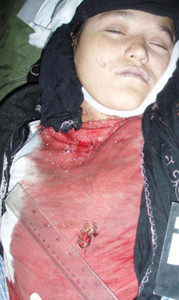Rights groups in central Afghanistan have raised concerns about a rising tide of violence against women in this part of the country.
About 100 people, mainly women, met in the town of Bamyan on September 28 to quiz local officials and rights organisations on what action they were taking against a rising tide of violence against women in this part of Afghanistan.
“I can confidently say that violence against women in Bamyan has increased,” Rohullah Forogh, provincial head of the Afghanistan Independent Human Rights Commission (AIHRC). “I would suggest creating a robust monitoring mechanism to prevent violence.”
Forogh said that in some cases, failure to take serious legal actions against perpetrators created a sense of impunity. Other speakers at the meeting also accused the police and judiciary of not taking adequate action on cases of this kind, delaying proceedings, and letting suspects go in return for bribes.
Mortaza Nejati, a local prosecutor who sits on the regional committee for preventing violence against women, rejected the allegations.

16-year-old Shakila was raped and killed by the district chief of a remote area of Bamyan province, Wahidi Beheshti. Medical evidence proved this but the culprit escaped punishment due to his strong ties to several members of the Parliament.
“If we have delayed any case despite the availability of evidence, you need to tell me which one…. we have pursued everything in a timely manner,” Nejati said.
The real challenge, he said, was investigating cases that occurred in remote parts of Bamyan, a highland area where travel is difficult.
“It’s very hard to get to the centre [Bamyan town] from those places. And then bringing in witnesses to testify is difficult,” he said.
The provincial head of the women’s affairs ministry, Torpekai Elkhani, told the gathering that contributory factors in the rise of gender violence included general ignorance about women’s rights and social problems like poverty, unemployment, illiteracy and narcotics addiction. But she also appeared to blame women themselves, suggesting they were too ready to stray from home and thus leave themselves open to assault.
A different meeting held at the Bamyan women’s affairs department the same month focused on the general question of whether Islam grants men and women equal rights.
Audience member Fatema Ahmadi asked how equality could be made to work in an Islamic society.
Provincial councillor Khalilullah Khalili said that there was nothing in the Koran or in the historical record of the Prophet Muhammad’s remarks and actions to indicate a secondary, less esteemed role for women.
“Islamic teachings accord men and women equal human rights,” he concluded. “The question of why equality is not made to happen in Islamic societies is a problem for Muslims, not for Islam.”
Civil society activist Mohayuddin Farahmand said women needed to build grassroots organisations to fight for their own rights and liberties. Without that, they would always have low status.
“These movements must be home-grown; they must not be foreign-influenced,” he added.
There was some debate about whether the correct term was “equal” or “similar”.
Hakima Akbari, a local women’s rights activist, said the distinction was a false one as the two concepts should be kept wholly separate. She argued that women were not “similar” to men in areas like ability to perform hard manual labour, but “as human beings, they have equal rights”.
IWPR hosted similar discussions in the southern Helmand province, which has been a hotbed of insurgent fighting for the last 13 years, in contrast to relatively calm Bamyan.
At a September 23 meeting in Lashkar Gah, however, officials and rights activists agreed that things were not too bad when it came to gender violence.
The head of the women’s affairs ministry in the province, Jamila Niazi, claimed that levels of violence against women were very low.
Instead, she said, the challenges facing women were different – “under-age marriage, high bride-price payments, women being denied their rights of inheritance and suchlike”.
Local women’s organisations and human rights groups say the reduction in gender violence in Helmand is largely thanks to their efforts.
Women’s rights activist Shahnaz Fayez said she and her colleagues had held meetings all across the province and had urged senior Muslim clerics to speak up for women’s rights in the mosque and at public gatherings.
The AIHRC’s head of women’s rights, Fatima Abedi, said her organisation’s focus had been on producing radio programmes on gender violence, and also on engaging with tribal leaders and clerics.
This report is based on an ongoing series of debates conducted as part of IWPR’s Afghan Youth and Elections project. Open Minds: Speaking Up, Reaching Out – Promoting University and Youth Participation in Afghan Elections is an IWPR initiative funded by the US embassy in Kabul.



